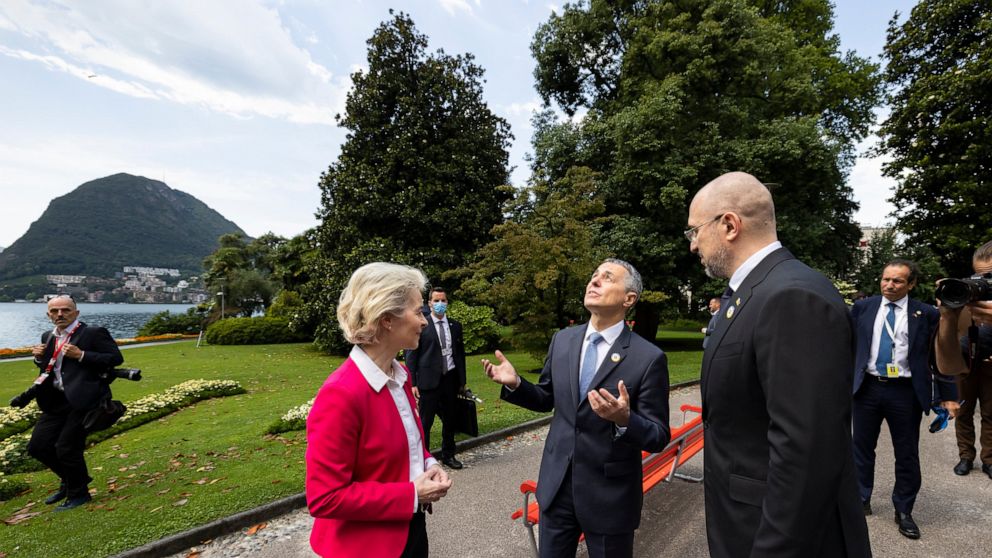Top NGO calls Switzerland a ‘safe haven’ for Russian oligarchs
LUGANO, Switzerland — A leading Swiss non-governmental group on Monday called Switzerland a “safe haven” for Russian oligarchs and a trading hub for Russian oil, grain and coal.
Public Eye urged the Swiss executive to “use all the levers at its disposal to stop the financing of this inhuman aggression”, in reference to Russian President Vladimir Putin’s war in Ukraine which has killed thousands, driven millions their homes, and impacted the global economy by driving up food and fuel prices.
The group spoke on the day the Swiss president opened a conference on Ukraine’s possible recovery from the Russian war involving government officials, advocacy groups, the private sector, academia and organizations from the United Nations United.
Ignazio Cassis was hosting leaders, including Ukrainian President Volodymyr Zelenskyy via video message, at the Ukraine Recovery Conference in the bucolic lakeside city of Lugano. Swiss diplomats say the meeting aims to chart a way forward for the world to help the war-scarred country recover and rebuild when Russia’s war one day ends.
Cassis and Ukrainian Prime Minister Denys Shmyhal, co-hosts of the meeting, hosted a parade of envoys, including European Commission President Ursula von der Leyen and British Foreign Secretary Liz Truss.
The conference builds on a multi-year, multi-country discussion of reform in Ukraine – even before the war started – but this time the focus is on “reviving” the war. Dozens of ministers, lawmakers and other Ukrainians were also present.
Environmental groups want to help Ukraine build back better. Lobby groups Solar Power Europe and Wind Europe, along with their Ukrainian counterparts, have urged Ukraine to set a goal of producing at least 40% of its electricity from renewable sources by 2030, which will put it in accordance with the objectives of the European Union.
According to the International Energy Agency, Ukraine generated less than 10% of its electricity from renewable sources in 2019, the latest year for which data has been published. Most of Ukraine’s electricity comes from nuclear power and burning coal.
A small group of Greenpeace activists have staged a media stunt by pretending to install a fake wind turbine on the shores of Lake Lugano, as part of a call for Ukrainian NGOs to support sustainable energy development in the country. infrastructure was extensively damaged.
In its call for transparency and better regulation in Switzerland, Public Eye said that “as a haven for oligarchs close to the Kremlin and as a trading hub for Russian oil, grain and coal, the Switzerland bears a great political responsibility”.
He said Switzerland has over the years been a “popular haven” for Russian business tycoons to park their assets. The group said the companies are using Switzerland as an “unregulated commodity trading hub” and exploiting a lack of transparency about financial transactions in the country.
There was no immediate response from the Swiss government.
The group hailed Switzerland’s “humanitarian commitment” to Ukraine at the conference, but called on the government to strictly enforce international sanctions against Russian elites and their government, and better regulate its trading hub.
Switzerland is a major international financial center and its government has traditionally touted Swiss “neutrality” – which is enshrined in law – and Switzerland’s role as an intermediary between hostile countries and as host to many international and UN institutions.
The Swiss Bankers Association has estimated that assets of Russian customers deposited in Swiss banks total 150-200 billion Swiss francs (about $155-210 billion), making the country a key depository of Russian money in the world. ‘foreign.
Switzerland, which is not an EU member, has largely embraced the bloc’s sanctions against Russia. The website of the Swiss Federal Department of Economics says that as of May 12, a total of 6.3 billion francs have been frozen in Switzerland in connection with Russia’s war in Ukraine.


Comments are closed.